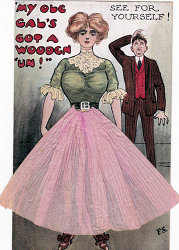|
BACKS "1d postage applies" |
|
|
|||||||||
|
When the divided back post card card came into existence in 1902 the format was initially only valid in Great Britain until the end of 1906. As a result most cards published prior to 1907 had a warning message. Such messages were not needed after 1906 but occasionally they reappear on cards published at a later date. For instance in about 1911 a whole series of cards by Comicus were published by Hutson Brothers with an outdated and unnecessary warning message. The above verbose message, with its reference to the 1d. postage for cards to the British Possessions, appears to have been used by Delittle Fenwick & Co in 1906 and was used for comic cards in the DEFCO series for a number of years. The company also printed cards for other publishers and in 1908/9 several series of distinctive sets of comic post cards appeared - and in four there is a definite link with "F S" and/or the London View Co. Ltd. while in the final case there is a possible link. In addition I have found a firm that was using the back appropriately in 1906 with a possible "F S" connection. Below I include brief information on each series - and then suggest the possible connection. In most cases the number of dated cards is so low that the earliest recorded date may need revising. |
|||||||||
|
The DEFCO Series (Unsigned) |
|||||||||
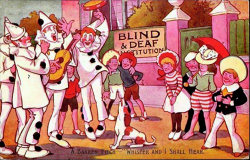 |
Earliest recorded with this back October 1906 |
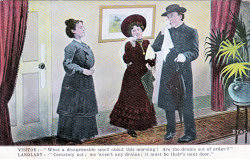 |
|||||||
|
The DEFCO comic cards are invariably unsigned and while there are definite similarities of style there are no cases where Spurgin can be clearly identified as the artist. However it is quite possible that he was responsible for some of the DEFCO comic cards with this back. |
|||||||||
|
Crown Series (1) (Some Signed "F S" = Fred Spurgin) |
|||||||||
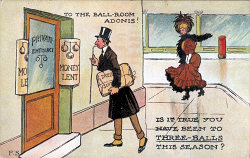 |
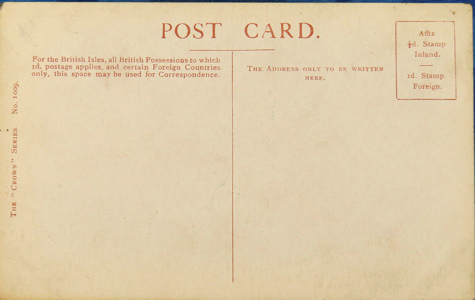 |
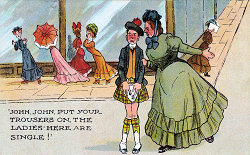 |
|||||||
|
This set is believed to have been followed by cards published by the "Crown Publishing Company" of St Albans. This company published the distinctive "Karaktus" cards (earliest recorded October 1908) and further "Crown Series" cards in the "F S" style. These all had post-1906 backs. |
|||||||||
|
The Infantastic Series (unsigned but by Fred Spurgin) |
|||||||||
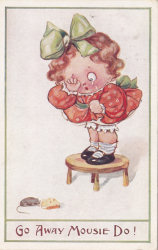 |
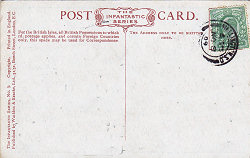 Earliest noted November 1909 |
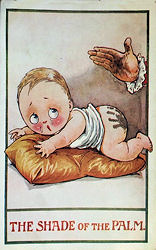 |
|||||||
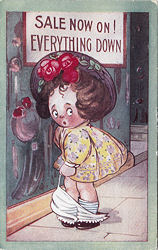 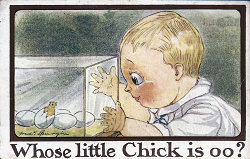 The
unsigned
Infantastic Series of about 30 cards was
produced by Fred Spurgin and published by
Watkins and
Krake, who operated between 1908 and 1910. Apart
from the Satire Series (below) none of the other cards
known to be produced by the firm had a similar back
while some earlier view cards published by Eustace
Watkins appear to be linked to the London View Company -
who published "F S" cards in 1906 and 1907. The
unsigned
Infantastic Series of about 30 cards was
produced by Fred Spurgin and published by
Watkins and
Krake, who operated between 1908 and 1910. Apart
from the Satire Series (below) none of the other cards
known to be produced by the firm had a similar back
while some earlier view cards published by Eustace
Watkins appear to be linked to the London View Company -
who published "F S" cards in 1906 and 1907.This series is probably a precursor of the unsigned Inter-Art "Kute Kiddies" series (left) and Fred Spurgin later produced many signed post cards for Inter-Art between 1911 and 1916. Not long after "Kute Kiddies" cards, signed by Fred Spurgin, started to appear (right) in the Paternoster Series, published by the Avenue Publishing Co. |
|||||||||
|
The Satire Series (signed "Dauber" = Fred Spurgin) |
|||||||||
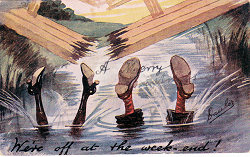 |
Earliest recorded June 1909 |
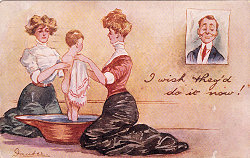 |
|||||||
|
The Satire Series was also published by Watkins and Krake and is signed throughout by "Dauber", and of course the above links with "F S" are also relevant. I can find no other cards signed "Dauber" and the pseudonym seems confined to this series. Compare the Dauber card (left) with the unsigned "F S" card published by the Crown Publishing Company (right) - so might "Dauber" be "F S"? |
|||||||||
|
The Popular Series (Unsigned - some might be Fred Spurgin) |
|||||||||
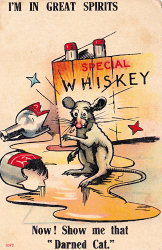 |
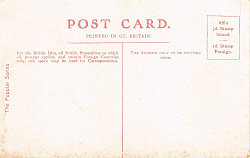 |
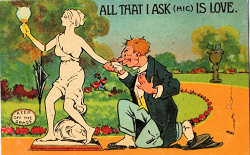 |
|||||||
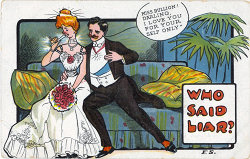 It is not known who published "The
Popular Series" and it may be that several publishers
used this series name. However a few months after the
London View Company Ltd closed four "F S" sets were reprinted
in the United States, and the same sets were also
republished in England (see right) as "The Popular
Series" but with normal "F S" style card backs. Shortly afterward a series of
distinctive unsigned comic post cards started to appear
in the Popular Series, with no publisher or address,
with the above back. It is not known who published "The
Popular Series" and it may be that several publishers
used this series name. However a few months after the
London View Company Ltd closed four "F S" sets were reprinted
in the United States, and the same sets were also
republished in England (see right) as "The Popular
Series" but with normal "F S" style card backs. Shortly afterward a series of
distinctive unsigned comic post cards started to appear
in the Popular Series, with no publisher or address,
with the above back.I have no information on the publisher or address of the "Popular Series" (or at least the "Popular Series" which republished "F S" cards in about 1908, or the cards with the Delittle, Fenwick & Co. backs shortly afterwards. |
|||||||||
|
The Paternoster Series (Signed Fred Spurgin) |
|||||||||
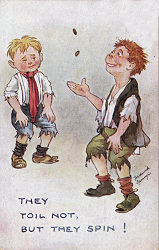 |
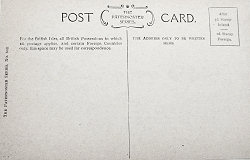 Earliest 11 June 1910 |
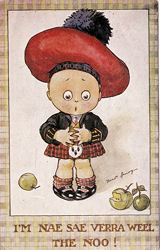 |
|||||||
| What clearly happened is that when Watkins and Krake broke up in 1910 Fred Spurgin moved his activities on the Infantastic Series and as "Dauber" to the Paternoster Series of the Avenue Publishing Co. but started signing the cards with his real name. In addition he continued working with the same printer and the same back of card. | |||||||||
| The "Blackpool" Connection | |||||||||
|
The Victoria Series (Signed "Syllikuss") |
|||||||||
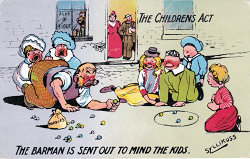 |
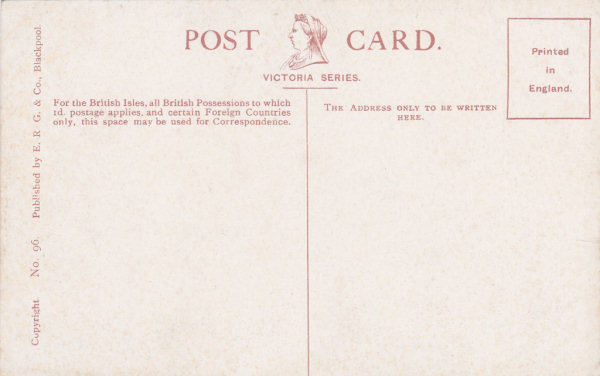 |
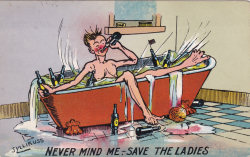 |
|||||||
|
E. R. Green & Co of Blackpool published a variety of post cards in the Victoria Series from 1904. These were mainly views but some comic cards - and the majority had more ordinary backs.. Some of the unnumbered and uncoloured view cards (believed to be early) had the above text, but the stamp box says "Printed in Germany." Starting in about April 1909 about 30 cards appeared, with the above back, signed by "Syllikuss." While there is no established direct link between the Blackpool publishers and "F S" or Watkins and Krake it is interesting to note that the first "Syllikuss" cards appeared almost immediately after the last "Karaktus" card was published by the Crown Publishing Company. This raised the possibility that "Syllikuss" and "Karaktus" were pseudonyms for the same person, although subsequent research makes this very unlikely - see False Trails |
|||||||||
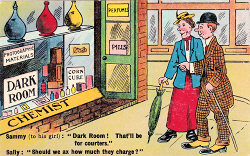 |
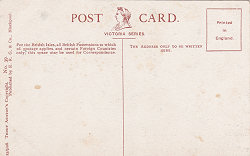 |
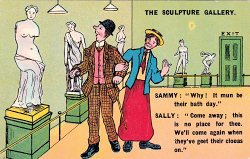 |
|||||||
|
Other Examples |
|||||||||
|
The "British Series" - Novelty Post Card Co, Liverpool |
|||||||||
|
Novelty Cards by C R Pinchbeck, Hull |
|||||||||
|
|||||||||
|
So what was going on ???? [This draft text will end up on a different page] |
|||||||||
|
Then in August 1907 the London View Company Ltd closed and in terms of new signed cards things went comparatively quiet until 1911 when he was again producing large numbers of new cards for Avenue Publishing (the Paternoster Series), and Inter-Art, and from 1915 Art and Humour. The above information may help fill the missing gap and suggest that Fred Spurgin was generating new (but unsigned) cards at a high rate between 1907 and 1911. Let us assume for discussion purposes that the common out-dated wording on the back (in at least the earlier cases) occurred because the instructions to print took place in the same office, and that Fred Spurgin was employed there (or was a regular free lance contributor). This office could have been 51 & 52 Beech Street, the offices of Watkins and Krake (after April 1908?). After all the early seaside cards by F S were published by Bernard Watlins as well as the London View Company, while Eustace Watkins (Bernard's brother) was producing view cards using the same printer as the London View Company. At the time Fred would have been busy trying out new ideas to try and replace his steady income from the "F S" cards he had been producing. ... ... ...
|
|||||||||


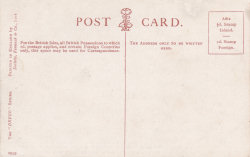
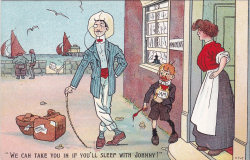
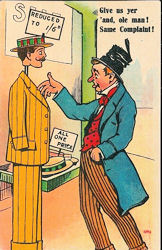 The
DEFCO series was produced by
The
DEFCO series was produced by 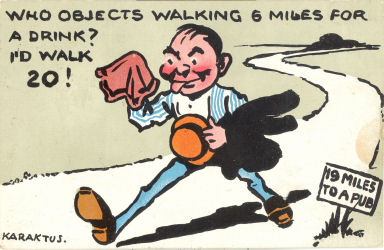
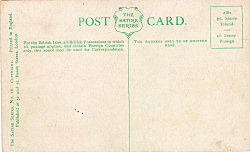
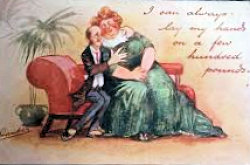
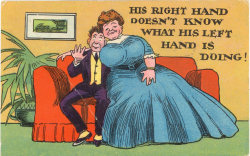
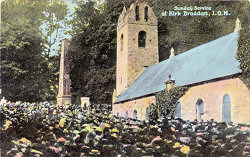
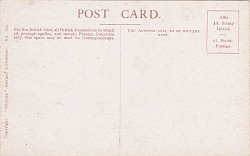
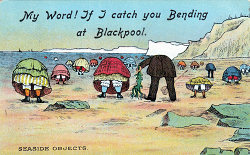
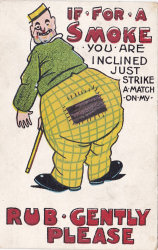
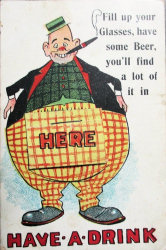
 Fill
up your Glasses, have some beer, you'll find a lot of it in HERE
Fill
up your Glasses, have some beer, you'll find a lot of it in HERE